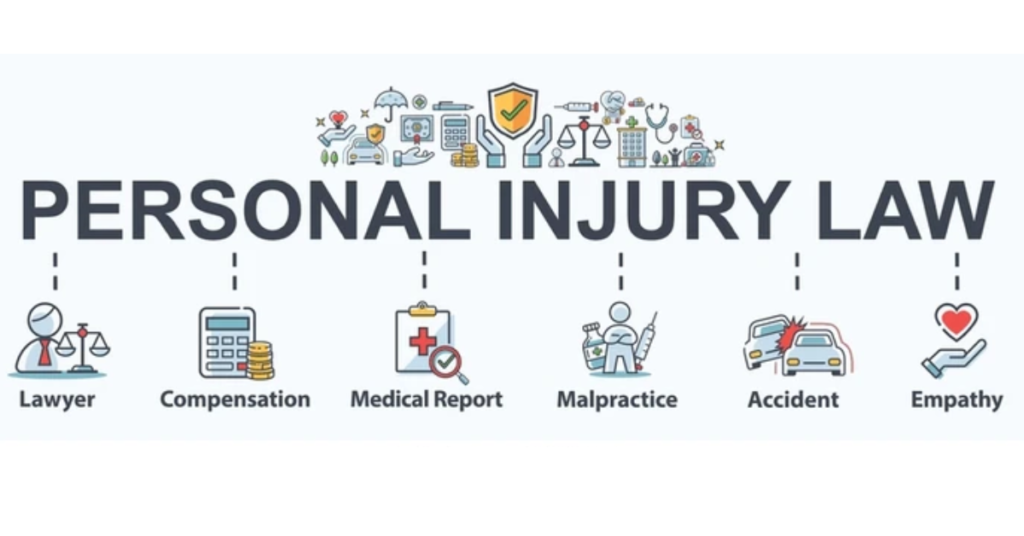When individuals suffer injuries due to accidents or negligence, they may find themselves in a difficult and often overwhelming situation. Whether it’s a slip and fall at a grocery store, a car accident, or an injury sustained at work, the aftermath can involve not only physical pain but financial strain as well. In such circumstances, consulting a personal injury lawyer can provide the guidance and support needed to navigate legal claims and secure compensation. This article explores what a personal injury lawyer does, why their expertise is essential, and how to find the right one for your needs.

What is a Personal Injury Lawyer?
A personal injury lawyer is a legal professional who represents individuals who have been physically or psychologically injured as a result of accidents, negligence, or harmful actions of others. These lawyers specialize in civil law, particularly in areas related to torts, which involve wrongful acts leading to harm or injury. Unlike criminal law, which deals with actions that are prosecuted by the state, personal injury law focuses on obtaining compensation for the victim.
In personal injury cases, lawyers can work with clients to secure damages for pain and suffering, lost wages, medical expenses, and other related costs. The primary goal is to ensure that the injured party is compensated fairly for the harm they’ve endured.
Types of Personal Injury Cases
Personal injury lawyers handle a broad range of cases. Below are some of the most common types of personal injury cases:
1. Car Accidents
Car accidents are one of the leading causes of personal injury cases. Whether it’s a rear-end collision or a serious multi-vehicle crash, those involved may suffer from broken bones, head trauma, and other serious injuries. A personal injury lawyer can help victims file claims against insurance companies, ensure proper medical treatment, and represent their interests in court if necessary.
2. Slip and Fall
Premises liability cases arise when individuals slip, trip, or fall on someone else’s property due to unsafe conditions. For example, wet floors in a store, poorly maintained sidewalks, or uneven stairways can lead to accidents. If the property owner was negligent in maintaining their property, they may be liable for the injuries that occurred.
3. Medical Malpractice
When medical professionals fail to provide the standard of care expected in their field, patients may be harmed. Medical malpractice cases can involve misdiagnoses, surgical errors, improper treatment, or failure to inform a patient about potential risks. These cases are often complex and require expertise in both medical and legal fields.
4. Workplace Injuries
Personal injury lawyers also represent clients who have been injured at work. While workers’ compensation insurance is often available, workers may still pursue additional compensation if their injuries were caused by negligence or unsafe working conditions. A lawyer can help navigate the complexities of both workers’ compensation claims and personal injury lawsuits.
5. Product Liability
In cases where a defective product causes harm, a personal injury lawyer can pursue a product liability claim. Manufacturers, distributors, and retailers may be held responsible for injuries caused by unsafe or faulty products, from household items to medications.
6. Wrongful Death
When a person dies due to the negligence or intentional act of another, the family members or loved ones of the deceased may file a wrongful death lawsuit. This type of case often arises from car accidents, workplace accidents, medical malpractice, or criminal acts.
Key Terms in Personal Injury Law
Understanding key legal terms is important when dealing with a personal injury claim. Here are some common terms that a personal injury lawyer might use during the process:
Negligence
Negligence refers to the failure to exercise reasonable care, resulting in harm to another person. In personal injury cases, a lawyer must prove that the defendant was negligent in order to win the case.
Damages
Damages refer to the financial compensation awarded to the injured party. There are two types of damages in personal injury cases:
- Economic Damages: These are quantifiable costs, such as medical bills, lost wages, and property damage.
- Non-Economic Damages: These are more subjective, including compensation for pain and suffering, emotional distress, and loss of enjoyment of life.
Liability
Liability refers to the legal responsibility for the harm caused. In personal injury cases, the defendant is often held liable for the injuries of the plaintiff.
Settlement
A settlement occurs when both parties agree to resolve the case outside of court, usually with a financial payout. Personal injury lawyers often negotiate settlements to avoid the time and expense of going to trial.
Statute of Limitations
The statute of limitations is the time limit within which a personal injury claim must be filed. This period varies by jurisdiction and the type of injury, but failing to file within the time limit can result in the loss of the right to sue.
Why You Need a Personal Injury Lawyer
While it’s possible to represent yourself in a personal injury case, having a skilled lawyer on your side can significantly increase your chances of obtaining fair compensation. Here are several reasons why hiring a personal injury lawyer is essential:
1. Legal Expertise
Personal injury law is complex and varies by jurisdiction. A lawyer specializing in personal injury cases has the knowledge and expertise to navigate the legal system, understand the nuances of the law, and build a strong case on your behalf.
2. Negotiation Skills
Insurance companies often attempt to settle cases for as little money as possible. Personal injury lawyers are skilled negotiators who can advocate for the maximum compensation available to you, ensuring that all damages are accounted for, including long-term medical expenses and emotional distress.
3. Access to Resources
Personal injury lawyers have access to experts, including medical professionals, accident reconstructionists, and investigators, who can strengthen your case. They can gather evidence, interview witnesses, and build a strong argument to support your claims.
4. Court Representation
If your case goes to trial, having an experienced lawyer to represent you in court is crucial. Lawyers are familiar with courtroom procedures, rules of evidence, and how to present your case effectively.
5. No Upfront Costs
Many personal injury lawyers work on a contingency fee basis, meaning they only get paid if you win the case. This makes hiring a lawyer financially feasible, as you don’t have to pay anything upfront.
How to Find the Right Personal Injury Lawyer
Finding the right personal injury lawyer can feel like a daunting task, but it doesn’t have to be. Here are some steps to help guide your decision:
1. Research and Referrals
Start by conducting research online, looking for lawyers who specialize in personal injury cases in your area. You can also ask friends, family, or colleagues for referrals if they’ve had positive experiences with a particular lawyer.
2. Check Experience and Track Record
Look for a lawyer who has experience handling cases similar to yours. A lawyer with a proven track record of success can better understand the complexities of your case and provide a higher likelihood of achieving a favorable outcome.
3. Free Consultation
Most personal injury lawyers offer free consultations. Take advantage of this opportunity to discuss your case, ask questions, and determine if the lawyer is a good fit for you. Pay attention to how they communicate, their approach to your case, and whether they make you feel comfortable.
4. Understand the Fee Structure
Clarify how the lawyer charges for their services. As mentioned earlier, many personal injury lawyers work on a contingency fee basis, meaning they only get paid if you win. Make sure you understand any additional costs or fees that may arise during the process.
Conclusion
If you’ve been injured due to someone else’s negligence, a personal injury lawyer can be a valuable ally in ensuring that you receive the compensation you deserve. By understanding the types of cases they handle, the key legal terms involved, and the benefits of hiring an experienced attorney, you can make informed decisions about how to move forward with your case. A personal injury lawyer not only helps with legal representation but also provides peace of mind during a challenging time.




